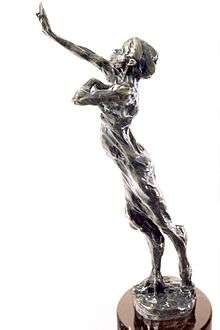Millennium Peace Prize for Women
| Millennium Peace Prize for Women[1] | |
|---|---|
 Anima Mundi, the award sculpture, by Tim Holmes | |
| Awarded for | Efforts to end conflict[2] |
| Sponsored by | United Nations Development Fund for Women (UNIFEM); International Alert[3] |
| Presented by | Dana Reeve[2][4][5] |
| First awarded | 2001 |
In 2001, as part of International Alert's Women Building Peace campaign, the United Nations Development Fund for Women awarded a Millennium Peace Prize for Women.[1][2][3][6][7][8] The bronze prize was commissioned from American figurative sculptor Tim Holmes, who has created several such international awards.[9][10] The sculpture, entitled Anima Mundi,[9][10] depicts a woman whose facial features combine elements of many races, reaching and striding forward, hand on heart.
Winners
The United Nations announced the following winners:[6][7][8][11][12][13]
| Year | Category | Recipient | Nation |
|---|---|---|---|
| 2001 | Individuals | Flora Brovina[3] | Kosovo |
| Asma Jahangir[4] | Pakistan | ||
| Hina Jilani[4] | Pakistan | ||
| Veneranda Nzambazamariya | Rwanda | ||
| Groups | Ruta Pacifica de las Mujeres | Colombia | |
| Leitana Nehan Women's Development Agency[14][15] | Papua New Guinea | ||
| Women in Black[16][17][18] | International |
Ceremony
A ceremony honoring the women and distributing the prize sculptures was held on International Women's Day, March 8, 2001 at the United Nations headquarters in New York City. Many of the women recognized shared their powerful stories of reconciliation in the face of violence. Individual awardees included Veneranda Nzambazamariya, recognized for the reconciliation she brought about as president of Pro-femmes Twese Hamwe, a collective of 32 women's organizations in Rwanda. The group was assembled shortly after the April 1994 massacre of Tutsis and sympathetic Hutus that resulted in one million deaths and the creation of more than two million refugees. Flora Brovina, president of the League of Albanian Women of Kosova, was honored for establishing a center that cared for women and children fleeing Kosovo during the Serbian occupation. In April 1999 she was arrested by the Serbian military for gathering food, clothes, and medical supplies for the Kosovo Liberation Army. (She was released in November 2000.) Pakistani human rights activists Asma Jahangir and Hina Jilani, were honored for helping to bring a feminist solution to the bitter conflict between India and Pakistan over Kashmir.
Two groups also won awards. Ruta Pacifica de las Mujeres, from Colombia, was acknowledged for teaching coexistence strategies to rural and professional women. The group also organizes women's marches, calling for peaceful resolutions to ongoing conflicts. And Leitana Nehan Women's Development Agency won an award for providing humanitarian relief to the women and children victimized by the nine-year war between Bougainville rebels and the Papua New Guinea military. Leitana Nehan also provides training in conflict resolution, promotes HIV/AIDS awareness, and teaches tactics to end violence against women.[19]
References
- 1 2 Bell, Imogen, ed. (2003). Central and South-Eastern Europe 2004. Regional Surveys of the World (4th ed.). Europa Publications. p. 699. ISBN 9781857431865.
- 1 2 3 Sandrasagra, Mithre J. (8 March 2001). "DEVELOPMENT: New Peace Prize to Honour Women". IPS Inter Press Service. Retrieved 5 November 2016.
- 1 2 3 Zirin, Mary; Livezeanu, Irina; Worobec, Christine D.; Farris, June Pachuta (2015). Women and Gender in Central and Eastern Europe, Russia, and Eurasia: A Comprehensive Bibliography. Routledge. p. 415. ISBN 9781317451976.
- 1 2 3 "BENEFITS - The New York Times". The New York Times. 4 March 2001. Retrieved 5 November 2016.
- ↑ "Millenium Peace Prize For Women Presented By The United Nations Photos and Images". Getty Images. Retrieved 5 November 2016.
- 1 2 "UNIFEM - Millennium Peace Prize for Women - 2001 Peace Prize Recipients". United Nations Development Fund for Women. 2001. Retrieved 5 November 2016.
- 1 2 Weatherford, Doris (2002). Women's Almanac 2002. Greenwood Publishing Group. p. 6. ISBN 9781573565103.
- 1 2 van der Gaag, Nikki (2004). The No-nonsense Guide to Women's Rights. Verso. p. 113. ISBN 9781844675029.
- 1 2 "The Millennium Peace Prize". United Nations Development Fund for Women. 2001. Retrieved 13 November 2016.
- 1 2 ""SCSU hosts exhibit by sculptor Tim Holmes"". St. Cloud State University. 24 September 2001. Retrieved 13 November 2016.
- ↑ Fréchette, Louise (8 March 2001). "WomenWatch - International Women's Day 2001". United Nations. Retrieved 5 November 2016.
- ↑ "PRESS BRIEFING BY UN DEVELOPMENT FUND FOR WOMEN ON MILLENNIUM PEACE PRIZE". United Nations. 8 March 2001. Retrieved 5 November 2016.
- ↑ "1st women's peace prize awarded". Associated Press. 9 March 2001. Retrieved 5 November 2016.
- ↑ Fung, Li (2005). "16: Engendering the Peace Process: Women's Role in Peace-building and Conflict Resolution". In Durham, Helen; Gurd, Tracey. Listening to the Silences: Women And War. Martinus Nijhoff Publishers. p. 236.
- ↑ Hakena, Helen; Ninnes, Peter; Jenkins, Bert A., eds. (2006). NGO's and Post-conflict Recovery: The Leitana Nehan Women's Development Agency, Bougainville. ANU E Press. pp. 47–48. ISBN 9780731537457.
- ↑ "Women in Black - Millennium Peace Prize Group". The Jamaica Observer. 12 November 2001.
- ↑ Anderson, Gary L.; Herr, Kathryn G., eds. (2007). Encyclopedia of Activism and Social Justice. SAGE Publications. p. 1478.
- ↑ Hawkesworth, M. E. (2006). Globalization and Feminist Activism. Rowman & Littlefield. p. 75. ISBN 9780742537835.
- ↑ "Peace of the Action". msmagazine.com. Feminist Majority Foundation. Retrieved 11 November 2016.